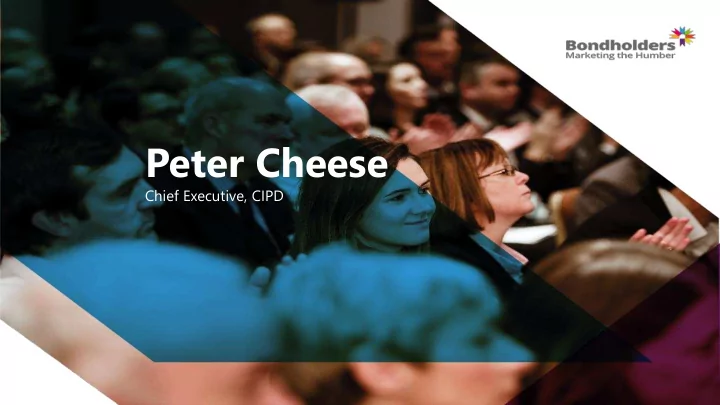

Peter Cheese Title here Title here Chief Executive, CIPD April 2015
The future of work – talent and skills Bondholder Breakfast Event 29th September 2017 Peter Cheese CEO CIPD
Forces shaping the future of work Political & Economic Globalisation Uncertainty The Changing Context of Work, Workforce & Technological Social & Demographic change Workplace change
The changing nature of work - #FOBO Probability Occupation ‘Computerisation 99% Maths technicians could replace up to 99% Insurance underwriters 47% of jobs in the US’ 98% Legal secretaries Top 10 in demand jobs 97% Dental lab technicians in 2010 didn’t exist in 95% Nuclear power reactor 2004 operators 94% Paralegals and legal 65% of school children assistants today will end up 94% Accountants & auditors doing jobs not yet 93% Tax examiners & collectors, invented & revenue agents 86% Real estate sales agents 15m jobs to be replaced by robots in 65% Librarians the next 20 years 61% Market research analysts & (BofE) marketing specialists 58% Personal financial advisors Source: Frey and Osborne (2013) Osborne and Frey, Oxford University 2013
Job disruption from technology Share of employers estimating that more than 30% of jobs will be automated in the next 10 years by sector 30% 25% 20% 15% 10% 5% 0% Sector level UK level RSA/YouGov Research, to be published
New opportunities • ’Gig’ work • Work distribution • Better quality work – co-botics • New jobs • Shorter hours, flexible working • New products, new markets • Access to markets, knowledge
Ways of working
What people look for in a job ‘Work frees us from boredom, vice, and need’ Voltaire
The War for Talent 2.0 40 MILLION THE DEFICIT OF HIGH-SKILLED WORKERS IN ADVANCED ECONOMIES 90 MILLION THE SURPLUS OF LOW-SKILLED WORKERS IN ADVANCED ECONOMIES SOURCE: McKINSEY & COMPANY
So what skills will we need in the future? Job Skills Technical and job/role skills Core Skills People Critical management, Organisational thinking & Financial Intra/Entrepre Digital skills skills situational neurship understanding understanding judgement diversity ‘Hard’ skills --------------------------------- ‘Soft’ skills Employability Work Communicati Skills Literacy and Resilience & Empathy and Understanding discipline & on skills numeracy learning skills collaboration self time mgt
Requires different thinking Skills building Recruitment Skills strategies retention Strategies to address Rightsourcing Job Design skills shortfalls
‘Rethinking’ the workforce relationship Voice Empowerment Re Recogn gnit ition ion Inclusion Purpose Well-being Alignment Fairness Shared values Worklife integration Trust
Recommend
More recommend